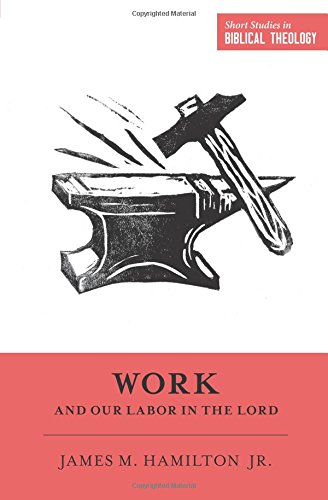Reviewed by Andrew J. Spencer
In the past decades there has been a resurgence of interest in the integration of faith and work. This has led to a large number of volumes on the doctrine of work from evangelical outlets. Sometimes these new books have a different author, but offer very little that is new to the conversation. Jim Hamilton’s recent book, Work and Our Labor in the Lord, is refreshing departure from that trend.
Hamilton is professor of biblical theology at the Southern Baptist Theological Seminary and a preaching pastor at Kenwood Baptist Church. He has the knowledge, disposition, and skill to read the biblical narrative and identify consistent, unified themes from the whole counsel of God. His experience as a pastor help him to take those themes and make them applicable to a wide audience.
This volume is a recent entry in a Crossway series, Short Studies in Biblical Theology. Each of the volumes looks at a different thread that is found interwoven throughout the canon. This text, following the common pattern of biblical theology, consists of four chapters that have the headings creation, fall, redemption, and restoration in addition to a separate introduction and conclusion.
In Chapter One, Hamilton outlines the state of work before Adam’s sin. Work was inherently good and was part of God’s design for humanity from the very beginning. Adam and Eve were given the duty of tending the garden of Eden. Work was intended to be a form of worship and reflection of God’s image in this world.
The second chapter outlines the negative effects of sin on the nature of work. God cursed the work of both Adam and Eve; it became painful and difficult. Still, humans were still intended to honor God by being obedient to make a living by cultivating the land. Humanity continues to corrupt the goodness of work and turn it toward different ends than God designed it, but Hamilton points out that there is still hope within work after the fall. God continues to work through human vocation for his own glory despite pervasive sinfulness. Though unworthy of the calling, people are still given opportunity to fulfill the mandate of Adam and Eve to worship through work. Hamilton illustrates this by walking through a number of Old Testament passages that illustrate the doctrine of work and its value in a fallen world.
Chapter Three shifts from the Old Testament to the New Testament, focusing on work after the cosmic redemption was begun in Christ’s death, burial and resurrection. Hamilton again traces the Bible’s witness to the goodness of work. He shows the continuity between the original purpose of work, its importance for serving faithfully before Christ’s earthly life, and its function as a means of foreshadowing the coming restoration in the eschaton. Hamilton emphasizes the function of work to adorn the gospel, demonstrate love for God, and show love toward neighbors. These are all significant, biblical purposes for work.
The fourth chapter is, in part, intended to counter the mythical idea that heaven will be an eternal vacation. Instead, as Hamilton explains, the new heavens and the new earth will reflect the restoration of work as it should have been all along. God’s creation mandate to Adam and Eve to rule and subdue the world will continue to stand. The difference will be that work will not be frustrated and that humanity will not fall into the patterns of sinful abuse of nature and each other that mark so much of work in the contemporary age. The hope of Christians is, therefore, not in a disembodied state, but in the perfection of the efforts we should be pursuing in this life.
Although brief, this volume serves as an excellent introduction to the literature on the topic. It is clear and concise. The prose communicates at a level that makes this volume suitable for use in the local church. At the same time, it is well researched and warrants consideration as a course text or simply as a reference for academic studies. Hamilton clearly succeeds in showing that the doctrine of vocation is woven throughout the entire canon of Scripture.
Despite the crowded field of literature on this topic, Work and Our Labor in The Lord breaks new ground. Hamilton gives evidence of understanding the ongoing conversation, but he does not fall into the trap of simply rehashing what others have said. This book has value for the church today and should retain that value for years to come.
Andrew J. Spencer is associate vice president for institutional effectiveness at Oklahoma Baptist University. He holds a Ph.D. in theological studies from Southeastern Baptist Theological Seminary. He is also a senior research fellow for the Institute for Faith, Work and Economics.
